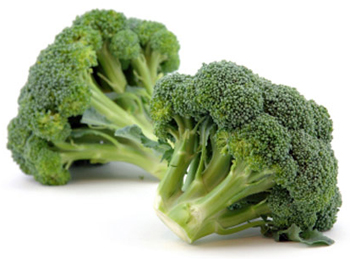 Broccoli is my least favorite vegetable. To me, there is simply nothing appealing about its taste, texture, or appearance. The sign above it at the farmer’s market, heralding “broccoli crowns cheap today” does not make my pulse beat faster or my heart sing. I’ve tried chopping up those crowns and hiding tiny slivers among carrots and zucchini. I’ve buried florets in omelets, fajitas, and quiches and covered them up with sauces ranging from hollandaise to mole to duck sauce and ketchup. I’ve tried arguing myself into taking just a bite or two under the category of “strong medicine” for the sake of health and wellness. But nothing has led me to reconsider my position: I don’t like broccoli. This may in fact be the only philosophical stance that I share with former president George Bush, who once went on record to declare his aversion to this particular vegetable.
Broccoli is my least favorite vegetable. To me, there is simply nothing appealing about its taste, texture, or appearance. The sign above it at the farmer’s market, heralding “broccoli crowns cheap today” does not make my pulse beat faster or my heart sing. I’ve tried chopping up those crowns and hiding tiny slivers among carrots and zucchini. I’ve buried florets in omelets, fajitas, and quiches and covered them up with sauces ranging from hollandaise to mole to duck sauce and ketchup. I’ve tried arguing myself into taking just a bite or two under the category of “strong medicine” for the sake of health and wellness. But nothing has led me to reconsider my position: I don’t like broccoli. This may in fact be the only philosophical stance that I share with former president George Bush, who once went on record to declare his aversion to this particular vegetable.
I realize, as George Bush soon discovered after his impolitic announcement, that broccoli has its aficionados, but I cannot find a single thing about it that’s enticing. Its very name is off putting. There is nothing sensual or succulent here: just that harsh opening of “br” followed by the even harsher short ”o” and “k” sounds (and not just one “c,” but two). And even then the word isn’t finished. It continues on, through two more syllables, the final syllable with its “l” and plural end form—i—working together to produce a sort of shriek that makes poetic hash of its singular form’s more musical ending (broccolo). It’s an altogether unappetizing and uninviting name.
And while a search online will turn up a considerable number of songs and odes to broccoli, very few of them come close to the sort of lovely, lilting — and far more abundant – poems that you can find on the subject of various fruits. The existence of these broccoli-inspired lines is hardly persuasive evidence of this vegetable’s right to rule — what subject hasn’t found its way online? More telling, in my book at least, is that while beans and peas provide pivotal plot points in fairy tales, I cannot recall a single folktale devoted to the subject of broccoli. I am slightly worried that my inbox will now fill up with evidence to the contrary, but if anyone knows of a storyteller who has spun broccoli into gold, I’d be happy to learn about it.
Nor am I moved by the dating of broccoli from classical antiquity, although it is amazing and confounding to contemplate the fact that this plant has flourished for over 2,000 years. It came to America only in the 1920’s; perhaps for Americans, there is still the thrill of the new. And maybe that is why, in addition to its low cost, it is the number one vegetable at mid-level restaurants, which persist in offering broccoli as the seasonal vegetable in every season. It’s true that there’s a little lull in late fall/early winter, at the height of root-vegetable season (another unappetizing name) when broccoli takes a break. On all the other days of the year, however, broccoli is the vegetable du jour—except on my plate.
Carolyn Foster Segal is an essayist and a professor of English at Cedar Crest College, in Allentown, PA, where she teaches creative writing and women's film.

